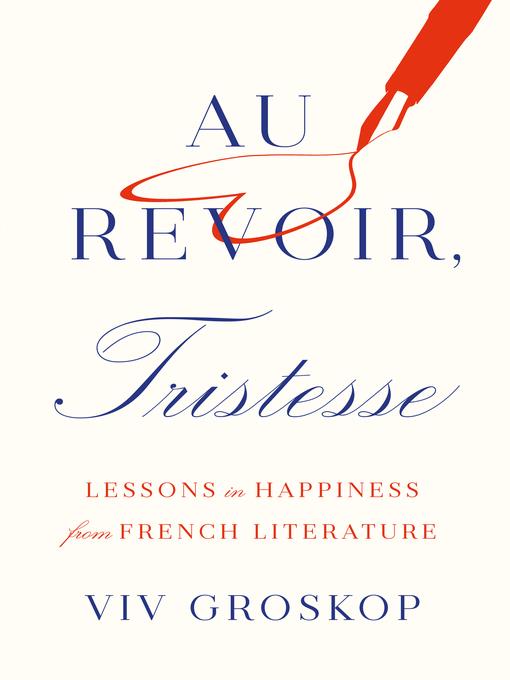
Au Revoir, Tristesse
Lessons in Happiness from French Literature
کتاب های مرتبط
- اطلاعات
- نقد و بررسی
- دیدگاه کاربران
نقد و بررسی

March 16, 2020
Journalist Groskop (The Anna Karenina Fix) embarks on a lighthearted and insightful romp through 12 of her favorite French literary works. Her unlikely conceit is to locate the joy in works that most find downbeat: Les Misérables, Madame Bovary, and The Stranger, among others. As she searches out the happy lessons from these grim tales (from Bovary, “True happiness may involve quite a lot of hypocrisy”), Groskop weaves in her lifelong fascination with French language and culture, once the embodiment of all that was chic and desirable to her. Groskop presents her younger self as a wide-eyed reader who interacted with texts with the innocent freshness of a more intelligent Bertie Wooster, to reliably amusing effect. The book’s greatest asset lies in Groskop’s restating of insights derived from literature, noting, for example, Proust’s observations that one of life’s joys is a sudden memory, or that Cyrano de Bergerac can show that “all we really want is... be slightly better than we are.” This is a book to dip into cheerfully, whether to recall novels read years ago or to find an entertaining entrée into those yet unread.

May 1, 2020
In twelve essays, Groskop (Anna Karenina Fix) discusses works of the French literary canon by authors including Fran�oise Sagan, Marcel Proust, Colette's Gigi, Edmund Rostand's Cyrano and Honor� de Balzac's Cousin Bette. Groskop recognizes that many of these titles were written by men and none by authors of color, and considers these works most interesting for her to revisit as she read many of them as a student. Groskop has an affinity for France. Every chapter boasts amusing personal anecdotes related to her French experiences, in addition to a discussion of a particular literary piece. She aptly notes that rereading a work such as Stendhal's Red and the Black, can elicit a different interpretation when it is read by choice rather than to complete a college paper. Groskop provides thoughtful interpretations (i.e., her analysis of Marguerite Duras's The Lover), but the book's purpose reflects its title, to find happiness. Groskop achieves this by frequently interspersing comic asides that some readers might find irritating. Her comments about authors' appearances, (Victor Hugo, "a man with bad hair," Gustave Flaubert a "mournful walrus") can become tiresome despite the attempt at hilarity. VERDICT A lighthearted read for all fans of French literature.--Erica Swenson Danowitz, Delaware Cty. Community Coll. Lib., Media, PA
Copyright 2020 Library Journal, LLC Used with permission.

March 1, 2020
A Francophile learns about life from French novels. Growing up in rural England, comedian, journalist, and podcast host Groskop wanted desperately to escape the conformity and dullness that surrounded her. Being French, she decided at a young age, "represented something so exciting for me: dynamism, energy, heat." She studied French in school, went to France on school exchanges, and had French-speaking pen pals. As she boasts repeatedly in this breezy, enthusiastic riff on 12 canonical (white, mostly male) writers, she learned to speak and read the language fluently, and she diligently immersed herself in Frenchness, "snorting up every little croissant crumb of culture and language I could find." Acquiring Frenchness brought her joy, she writes, and reading French literature has been "meaningful and life-changing." However, her attempt to show "the intersection between Frenchness and happiness" by glossing over works by Proust, Hugo, Camus, Flaubert, Balzac and others is unconvincing. From Fran�oise Sagan she learns that the French version of happiness is "being young--or stubbornly young at heart" and "living in the moment." From Colette's Gigi, "a slightly messier Cinderella story," she learns that "we can't all be born with agency and choices" but still can end up content. From Victor Hugo, she discovers that "personal happiness is intimately linked to having a clear conscience." Cyrano de Bergerac "is about body positivity"; like Gigi, Cyrano's "overall philosophy is this: make the most of what you've got and play to your strengths." From Guy de Maupassant, who, though a literary star, suffered from syphilis and tried twice to commit suicide, Groskop learned "that life is actually played out in a haze of different shades of gray." Stendhal teaches her "about the tempestuous nature of desire." There seems nothing particularly French about these life lessons, and, in the end, the author admits that her Francophilia came from needing "a pretend foreign identity in order to feel happy"--a need she has happily outgrown. An exuberant yet superficial celebration of French classics.
COPYRIGHT(2020) Kirkus Reviews, ALL RIGHTS RESERVED.

























دیدگاه کاربران